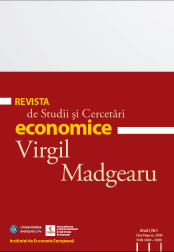DOES DIGITAL TRANSFORMATION CONTRIBUTE TO REDUCING POLLUTION? INSIGHTS FROM EUROPEAN OECD COUNTRIES
DOES DIGITAL TRANSFORMATION CONTRIBUTE TO REDUCING POLLUTION? INSIGHTS FROM EUROPEAN OECD COUNTRIES
Author(s): Alexandra-Anca PurcelSubject(s): Economy, Energy and Environmental Studies, Sociology, Economic development, ICT Information and Communications Technologies, Socio-Economic Research
Published by: Alma Mater & Universitatea »Babes Bolyai« Cluj - Facultatea de St. Economice si Gestiunea Afacerilor
Keywords: pollution; digitalization; cointegration; CS-(N)ARDL;
Summary/Abstract: Digital advancement is a key pillar of economic development that, through effective harmonization, can contibute to a sustainable future. Accordingly, this paper uses the Autoregressive Distributed Lag (ARDL) approach to study digital transformation’s long-run impact on environmental pollution. On the one hand, we find that digital transformation significantly reduces pollution, a result that holds for a wide set of robustness tests. On the other hand, the findings unveil heterogeneities with respect to digitalization components and countries’ structural characteristics. Overall, while these findings support the crucial role of digitalization in promoting sustainable growth, special focus should be directed to those components that are more likely to harm the environment.
Journal: Review of Economic Studies and Research Virgil Madgearu
- Issue Year: XVII/2024
- Issue No: 2
- Page Range: 171-194
- Page Count: 24
- Language: English
- Content File-PDF

